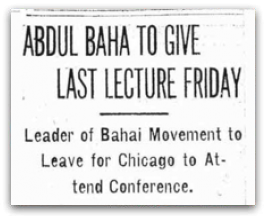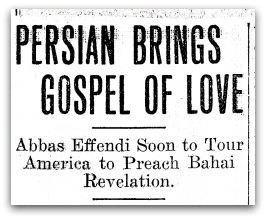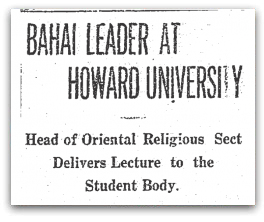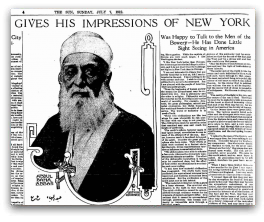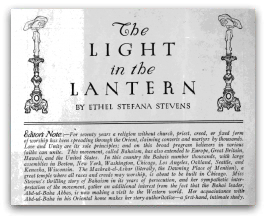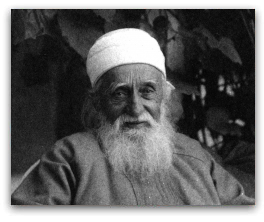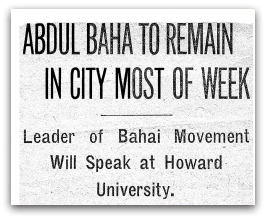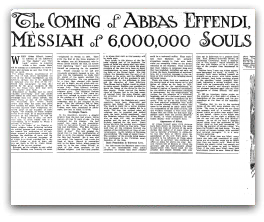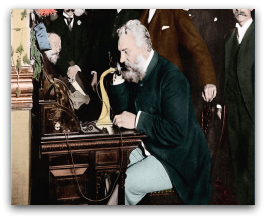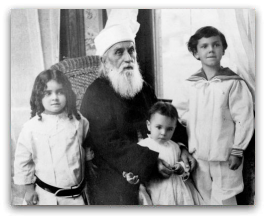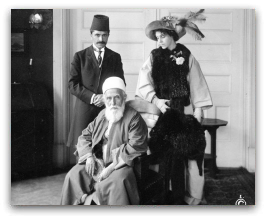Main menu
- ‘Abdu’l-Bahá’s Journey
- World Peace
- Stopping Racism in America
- Empowerment of Women
- More Principles...
- Prayer for America
Washington, D.C.
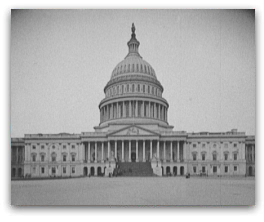
‘Abdu’l-Bahá visited the nation’s capitol three times during His 239 days in America. He was the guest of a wealthy Washington socialite, Mrs. Agnes Parsons (1861-1934), a devoted Bahá’í. A listing of Mrs. Parson’s “prominent friends” reads like a “social register of the capital” at that time.
Mrs. Parsons had a house built (at 1818 R Street) for ‘Abdu’l-Bahá’s stays. Although ‘Abdu’l-Bahá had already rented a house He accepted her invitation out of kindness. Except for frequent speaking engagements and other obligations, scores of people were received in this house from morning until night.
Racial prejudice was in its heyday in the Washington of 1912. Even the Washington Bahá’í community of that day was not immune to its deadly virus. ‘Abdu’l-Bahá openly challenged the status quo in words and deeds. Speaking at Howard University—an all-black institution—He said, “If the heart is pure, white or black or any color makes no difference. God does not look at colors; He looks at the hearts.”
At an all-whites luncheon where many of the glitterati of Washington society were present, ‘Abdu’l-Bahá suddenly stood up, looked all around, and said to His host: “Where is Mr. Gregory? Bring Mr. Gregory!” The host rushed to get Louis Gregory (1874-1951), a distinguished black Bahá’í who was no doubt thought to be one of the blacks serving those present at the table. Mr. Gregory was brought to the head of the table and seated in the place of honor at ‘Abdu’l-Bahá’s right.
In Washington ‘Abdu’l-Bahá asserted that harmony between the black and white races would be an assurance of the world’s peace.
At times the incredible positive response of American’s to His Father’s faith overwhelmed ‘Abdu’l-Bahá. One night while traveling by carriage to visit the inventor, Alexander Graham Bell (1847-1922), ‘Abdu’l-Bahá suddenly cried aloud:
‘O Bahá’u’lláh! What hast Thou done? O Bahá’u’lláh! May my life be sacrificed for Thee! O Bahá’u’lláh! May my soul be offered up for Thy sake! How full were Thy days with trials and tribulations! How severe the ordeals Thou didst endure! How solid the foundation Thou hast finally laid, and how glorious the banner Thou didst hoist!’
There were those who rebelled against ‘Abdu’l-Bahá’s teaching. For the most part they were clergy. In one instance a Christian clergyman who had already attacked ‘Abdu’l-Bahá’s message in England in 1911 handed out tracts against His teachings outside the meeting place. The response to this individual came from the leading Bahá’í scholar in the world whose work ‘Abdu’l-Bahá had published in America as The Brilliant Proof in 1912.
During ‘Abdu’l-Bahá’s third visit to Washington, as in San Francisco, He again addressed a large Jewish congregation at the Eighth Street Temple (Jewish Synagogue). Again ‘Abdu’l-Bahá courageously introduced the subject of “His Holiness Jesus”. “This produced a stir among the people, and an effort was made by the Rabbi … to stop the address…. some of the Jews sitting near the pulpit actually made signs to the interpreter that the time was over. But the Master ignored this and went on.”‘Abdu’l-Bahá remained aloof above all attacks and controversies, aiming instead at peace, unity and above all, aiming at love.
Often those who came face-to-face with Him were choked with emotion and could find no words to adequately describe Him. Then Secretary of the Treasury, Lee McClung breakfasted with ‘Abdu’l-Bahá and said afterwards, “I felt as though I was in the presence of one of the great old Prophets: Elijah, Isaiah, Moses. No it was more than that! Christ…no, now I have it! He seemed to me my Divine Father.”
Click here for a map showing all the sites visited by ‘Abdu’l-Bahá in Washington., D.C.
Talks and Stories
- 1 of 3
- ››












